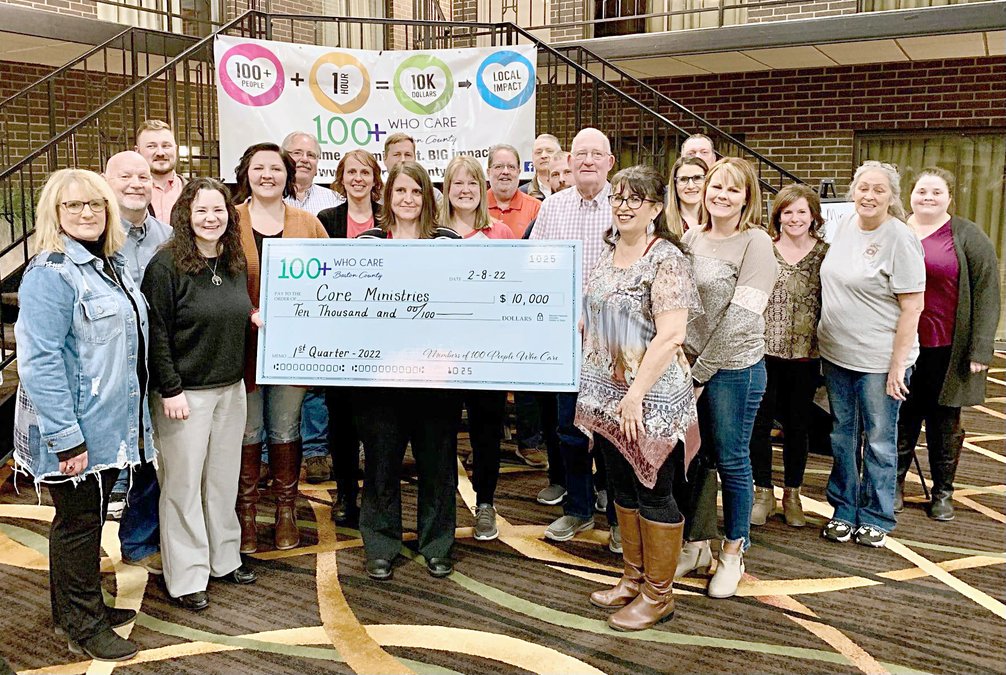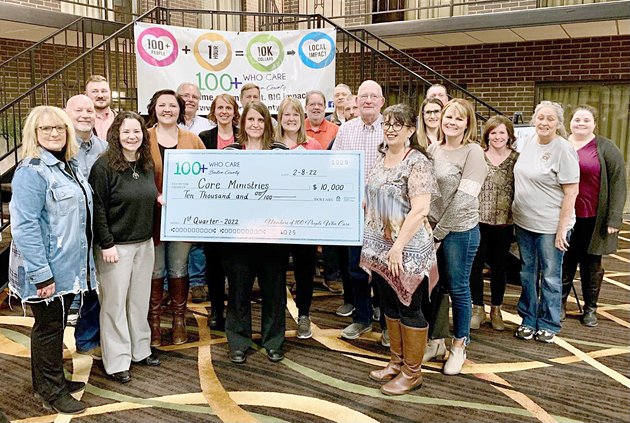Editor’s note: This is the second in a two-part series addressing the issue of poverty in Great Bend. Today’s story looks at how the problem is being addressed in the community.
Poverty is Great Bend is an issue with many different causes and no single “golden fix.” While a person in poverty has to want help and be willing to reach out for it, having a community committed to helping those in need is a crucial part of the solution.
Core Community is a local organization that seeks to help individuals get out of poverty through education and mentoring. Leaders with Core Community say a key to breaking the cycle of poverty is forming and building positive relationships. This is especially true because the cycle is often perpetuated by more destructive relationships.
Positive relationships provide extra layers of support and accountability, said Rachel Hyatt with Core Community. “It’s someone who can walk alongside you and support you as you work to get ahead.”
With the significant stress that poverty can place on children, Park Elementary School Family Support Worker Alana Blessing said Great Bend USD 428 also focuses on providing a safe place for students to relieve stress and build positive relationships, and making that a daily part of the students’ educational day. The district places a high priority on addressing the mental health of all students.
At Park Elementary, all classrooms have a morning conversational period built into the beginning of each instructional day. It promotes compassion and empathy by promoting positive relationships both from student to student, and from student to teacher.
“It helps teachers be more aware and mindful when that child is acting out or sad or depressed,” Blessing said. “That helps them understand what is going on in their life. And it helps them understand what their life looks like outside of our school.
“When we look at our kids and how we can help them, we have to think outside of the box and think about the social-emotional piece of the puzzle, and that involves a lot of relationship building,” Blessing said.
Three schools in Great Bend were recently recognized by the Kansas State Board of Education with Challenge Awards for their efforts in educating student populations with a high percentage of students from disadvantaged backgrounds, including those who live in poverty.
Addressing core drivers through action
Sara Hayden, director of Great Bend Economic Development, said Great Bend isn’t alone in facing increasing incidences of poverty. The issue is becoming increasingly common in rural communities where wages have long been stagnant.
A lack of quality market-level housing is another issue Hayden sees as a driver across all income levels, and something she feels is crucial for the community to address. While there is significant low-income housing available, once people extend above the income levels there aren’t enough middle-income houses available to meet the need.
“When we don’t continue development (and) progress, then it’s hard to elevate our community as a whole,” Hayden said.
Local entities are working to address this issue through new housing developments and Community Development Block Grant Programs, but she said these solutions will not happen overnight.
“The industry (wage) standards have changed around us,” Hayden said. “But we’ve got many fantastic employers that have recognized this and are working toward a solution.”
In that vein, GBED is hosting a Grow Workforce Summit and Job Fair over two Saturdays in April. One of the focuses is giving local employers the tools to be able to increase wages while still being able to run a successful and profitable business.
Great Bend City Administrator Kendal Francis said attracting new employers is also a key piece of the puzzle. With so much of the region’s economy and job market tied into the ups and downs of the agriculture and oil industries, the city needs to draw other high-wage employers such as technology or health-care firms to build upon that.
Francis said stepping up workforce training efforts is also important, to prepare residents for skilled job openings that might be available. In the past, he said, there have been discussions about partnerships with area educational institutions, including Barton Community College, to make more of this type of training more readily available.
Affordable childcare
One significant issue Hayden sees keeping people out of the workforce is a shortage of affordable childcare. GBED is working with both the city and county to address this.
Right now, according to data from Child Care Aware of Kansas, there are more than 700 children in Barton County in need of childcare for whom spots are not currently available. That keeps about 549 individuals out of the workforce in order to be home caring for those children and not bringing in income, Hayden said. With over 700 listed job openings currently in the county, adequate childcare facilities would make a significant impact in the workforce.
With that in mind, GBED has been working with the Barton County Commission and the City of Great Bend to work toward the construction of a new childcare center in Great Bend. Both the city of Great Bend and the county recently offered financial support; $70,000 from the city and $435,000 from the county is earmarked specifically for the construction of a $1.6 million daycare center. GBED has already raised an additional $435,714 through tax credits and private and municipal support.
Even if childcare is available, it is still a significant household expense. Through continued advocacy efforts from many different groups, Hayden said the state recognizes the need for quality and affordable child care, and she sees more grants and other possibilities opening up to help parents defray childcare expenses.
She also sees employers increasingly recognizing this as a significant workforce barrier, and moving toward offering childcare scholarships, as well as offering more flexible scheduling to draw more parents back into the workforce.
It takes everyone
Hayden said addressing poverty, or any issue in Great Bend, begins with people willing to be champions and advocates for the community.
Those already in that situation may not necessarily know how to advocate for themselves or what resources are available to them. Having an advocate to address crucial issues with city leaders is vital, as is having community members actively support grassroots efforts already in place to create positive change.
“Anything citizens can do to step up, take notice and say, ‘Okay, we’re going to do something to help, we’re going to do something to change it,’ I think that’s huge and so important,” Hayden said.
Amanda Howard, Resource Coordinator at Core Community, said taking the time to know someone’s story before judging their circumstances is crucial, because circumstances can put almost anyone into that situation.
“There but for the grace of God, go I,” Howard said.
“It trickles down to everyone,” Blessing said. “From employment, to incarceration, what we’re seeing is going to affect our community further down the road. If we don’t turn it around, it’s going to be difficult, because our small town is turning into more of an at-risk population.”
Blessing said she already sees the community moving forward with many agencies, including Core Community, working together to address the issue and support those who deal with it.





